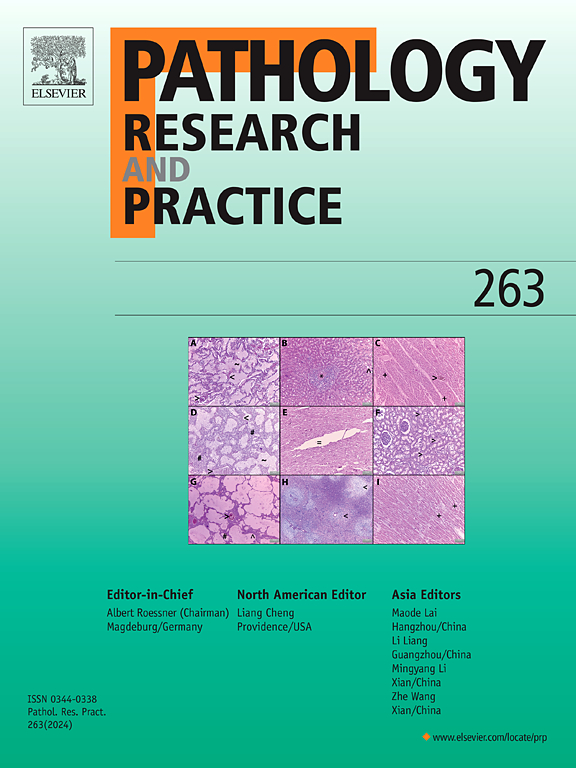机器学习在食管鳞状细胞癌生物标志物发现中的集成:应用和未来方向
IF 2.9
4区 医学
Q2 PATHOLOGY
引用次数: 0
摘要
近年来,测序技术和生物信息学算法的进步促进了肿瘤基础和临床研究的重大突破。然而,大规模数据的处理和利用继续构成重大挑战。基于机器学习(ML)的综合分析方法为导航这些复杂的数据集提供了一种新的方法,从而从多个角度增强了对肿瘤的理解。方法在此,我们全面概述了ML过程和方法,这些过程和方法有可能推进食管鳞状细胞癌(ESCC)的研究和管理。具体来说,我们的重点是在关键领域的应用,如早期检测,预后预测,治疗靶点识别和药物发现。此外,我们还研究了ML在ESCC研究背景下引入的挑战和机遇。结果我们的研究结果表明,机器学习技术具有增强医疗决策、改善患者护理和推动医疗保健进步的能力。机器学习在肿瘤学中的前瞻性整合提出了几个挑战,突出了跨学科合作的需要。应对这些挑战需要医疗专业人员、数据科学家、信息技术专家和政策制定者的协调努力。结论通过ML识别ESCC的生物标志物可显著提高医疗服务质量,支持专家诊断和治疗决策,从而显著提高诊断效率,推动智能医疗领域的发展。本文章由计算机程序翻译,如有差异,请以英文原文为准。
Integration of machine learning in biomarker discovery for esophageal squamous cell carcinoma: Applications and future directions
Purpose
Recent advancements in sequencing technologies and bioinformatics algorithms have facilitated significant breakthroughs in both fundamental and clinical tumor research. Nevertheless, the processing and utilization of large-scale data continue to pose substantial challenges. Machine learning (ML)-based integrative analysis methods present a novel approach for navigating these complex datasets, thereby enhancing the understanding of tumors from multiple perspectives.
Methods
Here, we present a comprehensive overview of ML processes and methodologies that have the potential to advance research and management of esophageal squamous cell carcinoma (ESCC). Specifically, our focus is on their application in key areas such as early detection, prognosis prediction, therapeutic target identification, and drug discovery. Additionally, we examine the challenges and opportunities that ML introduces in the context of ESCC research.
Results
Our findings indicate that ML techniques have the capacity to enhance medical decision-making, improve patient care, and drive progress in healthcare. The prospective integration of ML in oncology poses several challenges, highlighting the need for interdisciplinary collaboration. Addressing these challenges will require coordinated efforts from medical professionals, data scientists, information technology specialists, and policymakers.
Conclusions
The identification of biomarkers for ESCC via ML significantly enhances the quality of medical care and supports expert diagnostic and therapeutic decision-making, thereby markedly improving diagnostic efficiency and advancing the field of intelligent healthcare.
求助全文
通过发布文献求助,成功后即可免费获取论文全文。
去求助
来源期刊
CiteScore
5.00
自引率
3.60%
发文量
405
审稿时长
24 days
期刊介绍:
Pathology, Research and Practice provides accessible coverage of the most recent developments across the entire field of pathology: Reviews focus on recent progress in pathology, while Comments look at interesting current problems and at hypotheses for future developments in pathology. Original Papers present novel findings on all aspects of general, anatomic and molecular pathology. Rapid Communications inform readers on preliminary findings that may be relevant for further studies and need to be communicated quickly. Teaching Cases look at new aspects or special diagnostic problems of diseases and at case reports relevant for the pathologist''s practice.

 求助内容:
求助内容: 应助结果提醒方式:
应助结果提醒方式:


